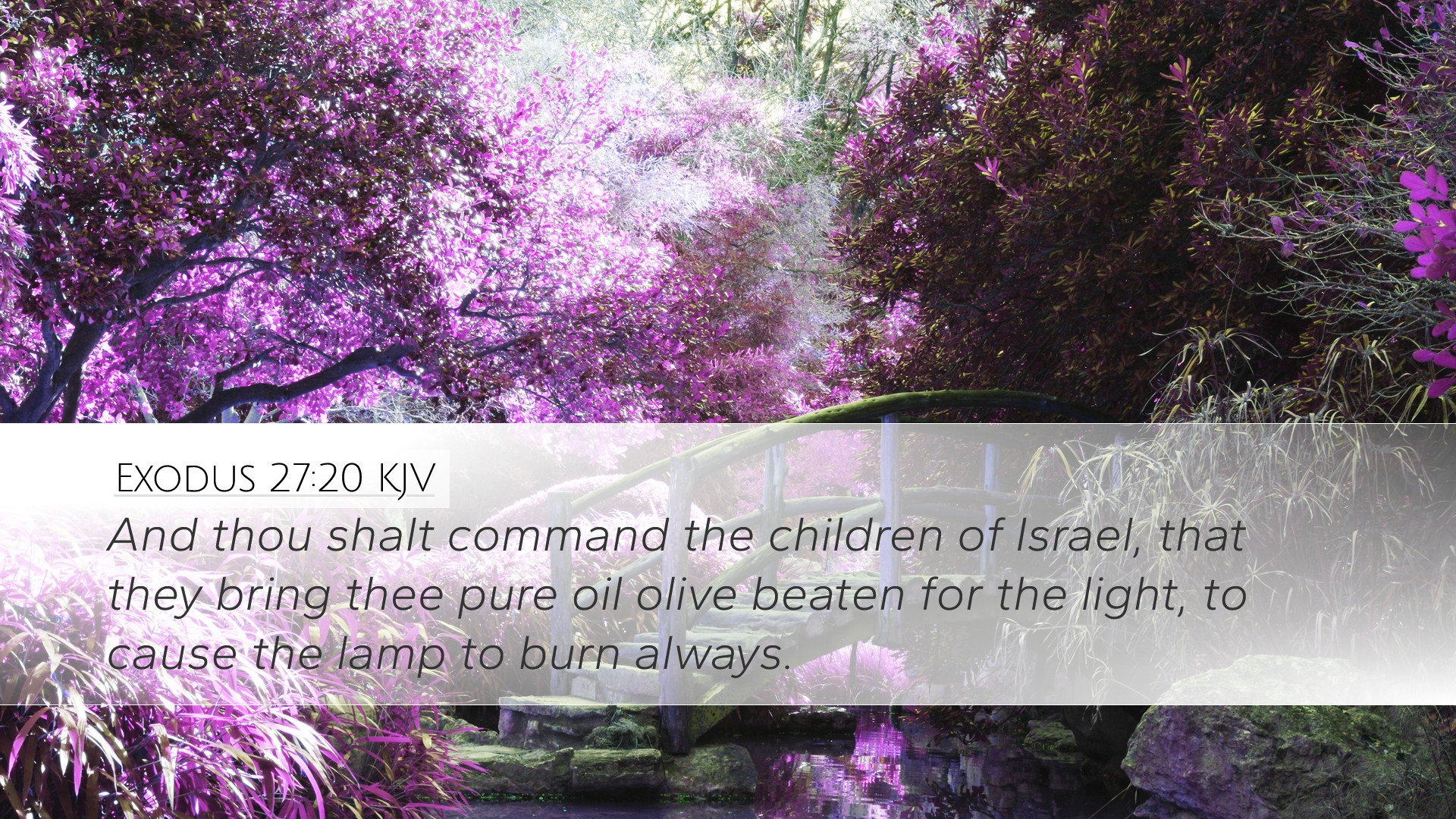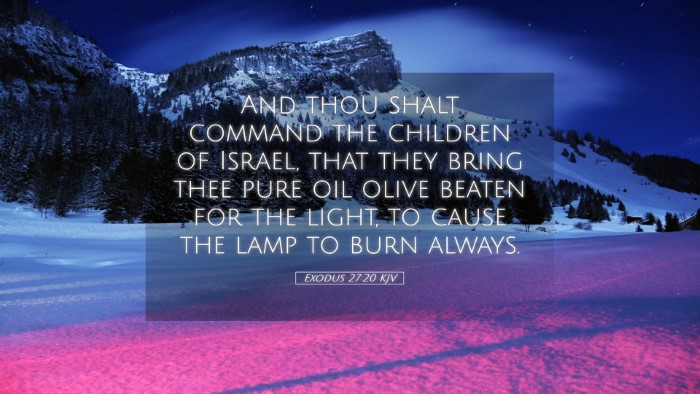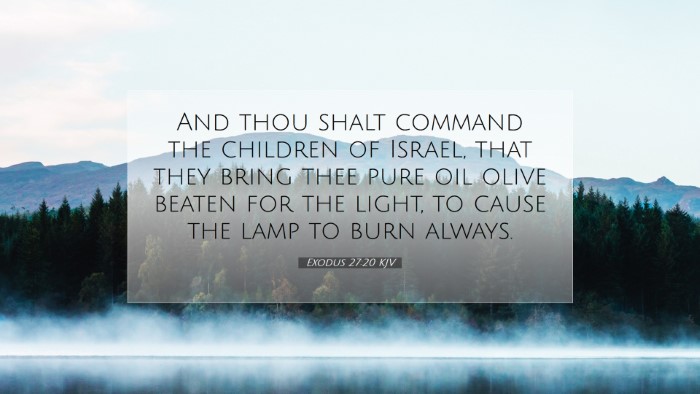Exodus 27:20 - Commentary Summary
Verse: "And thou shalt command the children of Israel, that they bring thee pure olive oil beaten for the light, to cause the lamp to burn always."
Context and Background
The Book of Exodus narrates the story of the Israelites' escape from Egypt and outlines the laws and instructions given by God to Moses. In Chapter 27, God provides specific instructions for constructing the Tabernacle and its furnishings, highlighting the importance of worship and the light that represents divine presence. The command in verse 20 focuses on the continual provision of oil for the lamp, symbolizing the perpetual nature of God’s presence among His people.
Insights from Public Domain Commentaries
Matthew Henry's Commentary
Matthew Henry emphasizes the significance of the olive oil, describing it as pure and beaten, which illustrates the quality and nature of what is to be offered to God. He writes that the oil is a symbol of the Holy Spirit and serves to illuminate the sacred space of the Tabernacle, representing God's enduring presence. The continuous burning of the lamp signifies the need for spiritual illumination and the ongoing relationship between God and His people.
- Symbolism of Light: The command centered around keeping the lamp burning continuously points to the light of God's truth and guidance.
- Quality over Quantity: Henry notes that the use of pure olive oil emphasizes the necessity of offering one's best to God, highlighting the principle of holiness in worship.
- Spiritual Vigilance: The continual burning of the lamp serves as a metaphor for the believer's need to maintain spiritual vigilance and the importance of sustenance in prayer and worship.
Albert Barnes' Notes on the Bible
Albert Barnes introduces the practical aspects of this command. He explains that the olive oil must be "beaten" rather than merely pressed, which points to the process required to produce something of pure quality. Barnes outlines how the oil's purpose is not merely aesthetic but functional, signifying that God desires not just sacrifices but the heartfelt intention behind them.
- Importance of Preparation: The process of beating the olives to extract oil signifies the deliberate effort required in worship and service to God.
- Candlestick as a Type: Barnes elaborates on the menorah as a type of Christ, the Light of the World, illuminating the deeper theological significance of light in the Scriptures.
- Continuous Supply: The instruction to ensure that the lamp remains lit emphasizes the necessity of a constant supply of spiritual resources from God, particularly the Holy Spirit.
Adam Clarke's Commentary
Adam Clarke adds depth by analyzing the legal and ritualistic aspects of the command. Clarke points out the significance of worship as a structure that God ordained for His people. He interprets the olive oil as a metaphor for the divine light of God that ought to shine forth in the lives of believers through the Holy Spirit.
- Divine Command and Obedience: Clarke reinforces that the command reflects God's sovereignty and the necessity for obedience among His people.
- Symbol of Holiness: The purity of the olive oil is symbolic of the holiness required for approaching God and suggests that the worship must be untainted by sin.
- Lamp as a Symbol of Life: He notes that the lamp burning continually represents the idea of life itself emanating from God, with the faithful being called to reflect His light in a dark world.
Theological Implications
The command for pure olive oil has profound theological implications. It serves as a reminder for believers to be dedicated to God with their best offerings, including their time, resources, and spiritual lives. The continuous fire of the lamp in the Tabernacle signifies the perpetual need for God's illumination in the lives of His people.
- Holy Spirit's Role: The oil is a representation of the Holy Spirit, emphasizing the necessity for the Spirit's work in illuminating believers' paths.
- Continuous Worship: The continuous burning of the lamp stresses the importance of maintaining an unbroken relationship with God through prayer and worship.
- Community Responsibility: This verse indicates a corporate responsibility among the children of Israel to ensure that the lamp is always burning, highlighting the collective nature of worship within the community of faith.
Practical Applications
For pastors, students, theologians, and scholars, the insights gained from Exodus 27:20 can translate into various practical applications in ministry and personal life:
- Quality Offerings: Strive to offer God the best of our resources and efforts in every ministry activity, ensuring that what is presented in His service is of the highest quality.
- Spiritual Disciplines: Foster spiritual disciplines that keep the lamp of faith burning brightly through regular prayer, study of the Word, and community worship.
- Encouraging Community Worship: Emphasize the importance of communal worship and accountability within the church body, ensuring that collectively, the light of God remains evident.
Conclusion
In conclusion, Exodus 27:20 encapsulates a powerful message about the importance of holiness, quality offerings, and the continual presence of God among His people. The rich commentary from esteemed scholars like Matthew Henry, Albert Barnes, and Adam Clarke provides a multidimensional view of this verse that extends beyond its initial context. Through understanding this passage, believers can be encouraged to reflect on their own spiritual practices, striving always to shine the light of Christ in their lives.


